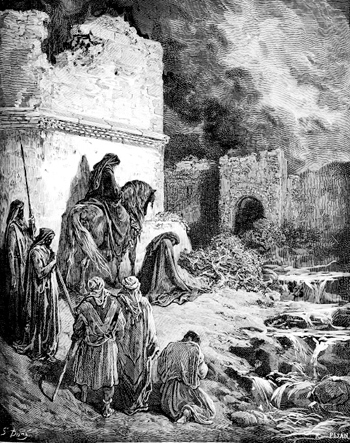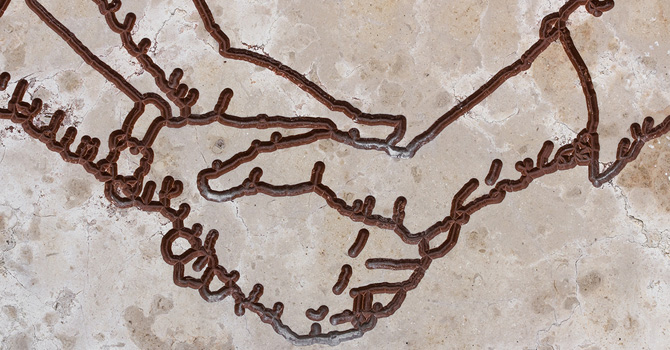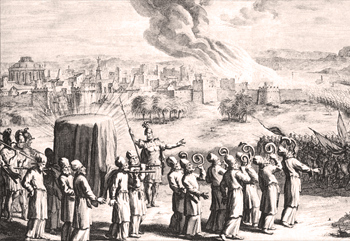Editor’s note: Faith & Leadership offers sermons that provide insight into Christian leadership. Timothy C. Tennent preached this sermon June 18, 2011, at the 2011 meeting of the North Carolina Conference of the United Methodist Church in Raleigh, N.C.
 One of the abiding values of God’s word is that we are privileged to see the true people of God being the people of God in a wide variety of situations. We see them dancing on the shores of the Red Sea with tambourines in their hands: “I will sing to the Lord, for he has triumphed gloriously; horse and rider he has thrown into the sea!” (Exodus 15:1 NRSV) God delivers his people!
One of the abiding values of God’s word is that we are privileged to see the true people of God being the people of God in a wide variety of situations. We see them dancing on the shores of the Red Sea with tambourines in their hands: “I will sing to the Lord, for he has triumphed gloriously; horse and rider he has thrown into the sea!” (Exodus 15:1 NRSV) God delivers his people!
We see them standing after three days of consecration in holy fear and breathtaking awe in the presence of God, as smoke, thunder and lightning goes up from Mount Sinai. The earth itself trembled as God spoke the covenant. God speaks to his people!
But the word of God also invites us into those intimate moments between Yahweh and his people. Yahweh calls a young boy in the middle of the night -- “Samuel! Samuel!” -- and he says, “Here I am”
(1 Samuel 3). God calls his people!
Who can forget that high and holy moment when the great prophet Isaiah sees the Lord, high and lifted up, his train filling the temple, with the angels crying, “Holy, holy, holy”? “Whom shall I send, and who will go for us?” And Isaiah says, “Here am I; send me!” (Isaiah 6). God calls his people!
We are also allowed to see the people of God in difficult times. The people of God have to be the people of God not only in the mighty days of Moses but also during the lean days of Eli, when, as
1 Samuel 3:1 says, “the word of the Lord was rare.”
Every man or woman of God longs to minister in those times when the glory of the Lord fills the temple, and visions of six-winged seraphs fill our lives, and the certainty of God’s word reverberates around our very being. But some are chosen to live in a time when the ark of God has been captured by the Philistines and a woman names her child Ichabod because the glory of the Lord has departed from Israel.
Some lived in the days of Solomon, when the temple was the splendor of the world and a wise king sat on the throne. Some, like Jeremiah, were called to be faithful to God even as they sat and wept on a hill overlooking the city of Jerusalem being burned to the ground and cried out, “O daughter of Jerusalem, ... your wound is as deep as the sea” (Lamentations 2:13 NIV [1984]).
We love to live in the exclamation marks of life, but sometimes we’re called to be faithful in the question marks of life. The exclamation mark is sure and straight, and the message is clear. A question mark is crooked and twisted, and sometimes it’s hard to see around it. Sometimes we don’t know how to interpret the times we are in. We all know what it is like to look out on what we think are the promises of God, even as we hear some declare, “Wow, milk and honey!” and others, “Oh no, look at those giants!”
My brothers and sisters, we must learn to recognize the times we live in. We are living in one of the great seams of history -- the seam between modernity and post-modernity, the seam between Christendom and post-Christendom, the seam between a predominately Western Christianity and the emergence of a post-Western Christianity.
We live in a post-communist, post-Christendom, post-denominational, post-Western, post-Enlightenment and post-modern world. We don’t even know what to call this new epoch we are entering; we just know we are “post” everything we have known.
The point is that we live in a time of uncertainty.
For many, many years, seminaries across North America prepared men and women for ministry in a society which was conceptualized as the modern-day equivalent of the promised land, a land full of spiritual milk and honey. A land where steepled towns rang their church bells and the faithful gathered to hear God’s word. A society where Judeo-Christian ethics were seamlessly embraced by the society at large.
At some point, those of us who teach students and preach in churches slowly began to realize that we were no longer in the promised land, but we were in Babylonian exile. We had been preparing students to sing the songs of Zion -- and instead, they were hanging their harps up and singing laments.
I’m actually not lamenting that we are in a time of lament. Lament is good, because lament is the mother of hope. What we don’t want to do is to pretend that the landscape has not changed and so fail to recognize the signs of our times.
Our text for this solemn occasion reminds us that Nehemiah lived at a seam time, too, didn’t he? Nehemiah was post-exile, pre-messiah. The long night of exile was over, and Jews were returning, but there was still no messiah. The walls of Jerusalem were torn down and its gates were burned with fire, recalling a day when things were better. Hope seemed dim. Most Jews believed that their best days were behind them. We can only imagine the conversations that took place around the dinner table. It was a time of rebuilding and seeking to rekindle hope.
We don’t know what kind of books might have been published in Nehemiah’s day. If on the eighth day God had said, “Let there be Zondervan,” just think of the books that could have been published. Moses could have been a best-selling author: “How to Pass Through Your Red Sea,” by Moses. His follow-up book: “The Purpose-Driven Nation.” Naturally, it would come with a study guide.
Moses has actually left us with five books. Nehemiah has given us a book, too. We just call it Nehemiah, but if it was sold as a separate book, it might appear under the title “Living as a Jew in a Post-Judaism World” or “Life Admist the Rubble.” Because in this book, Nehemiah helps us to understand what it means to be faithful to the call of God in a post-Jewish, post-covenant, post-temple world -- as well as our own post-Christendom, post-modern, post-everything world.
Nehemiah, as much as any of our dear brothers and sisters of the earlier covenant, would understand the world we inhabit. We have our Sanballats and Tobiahs. They are just known by different names: Richard Dawkins and Sam Harris. We live at a time when the whole matrix of the educational system, the political apparatus, the media, entertainment, etc. -- all stand arrayed against the church and the Christian gospel.
Many of you will be going into churches where even your own members do not know God’s word. Nehemiah also lived in a world when even the people of God did not know their own Scriptures. They had forgotten the mighty acts of God. It is the Old Testament scholar Walter Brueggemann who once said that the chief function of a prophet is to call people to remember -- to remember the mighty acts of God. Nehemiah understood that.
We mainly remember Nehemiah as the one who rebuilt the walls of Jerusalem, but chapter 8 of our text tells us about something else he rebuilt. He rebuilt the pulpit. The pulpit had also become part of the rubble, not just the temple and the walls. Nehemiah had a great pulpit built.
In Nehemiah 8:4 we are told that “a high wooden platform [was] built for the occasion.” The great priest of God Ezra was called upon to deliver the word of God in uncertain times. He opened the word of God and began to read. Thirteen Levites, chosen and consecrated by Ezra, stood by to instruct the people in the law while it was being read.
We don’t find a list of megastars, or any 5th-century B.C. version of Christian celebrities. These are not household names, then or now. We find a list of Levites whose names you have never heard of: Jeshua, Bani, Sherebiah, Jamin, Akkub, Shabbethai, Hodiah, Maaseiah, Kelita, Azariah, Jozabad, Hanan and Pelaiah. These are Levites you’ve never heard of, but God put their names in the Bible. Listen to verse 8: “They read from the Book of the Law of God, making it clear and giving the meaning so that the people could understand what was being read.”
This is what we need today. Here in this solemn assembly we give to the world a whole new generation of Banis and Sherebiahs and Jamins and Hodiahs and Kelitas and Azariahs! This is the need of the hour: men and women called to faithfully teach people the word of God in the midst of the rubble. They rebuilt the walls of Jerusalem with a trowel in one hand and a sword in the other. They understood the times they lived in.
If you had asked those around the broken walls of Jerusalem, every one of them would have preferred to live their lives with a tambourine in their hand, but instead they were called to live with a trowel and a sword. A time of rebuilding, a time of remembering, a time of hope.
These are amazing times -- living in the seam. Do you understand the signs of our times?
Globally, the church of Jesus Christ is growing and flourishing unlike any time in human history. At the same time, the United Methodist Church has been imploding for over four decades. You have a formidable challenge before you to fall in love with the church and be faithful to the gospel.
You must go forth from this service determined to do the one thing which must be done: rebuild the pulpit, remember the fundamentals, carefully instruct the people in the word of God.
The UMC must have men and women able to adapt to new situations, to be faithful in difficult challenges, and to live into the anointing of God when the Spirit is moving. You will experience pressures on every side. The post-Christendom culture will pressure you to abandon the gospel and compromise the word of God. You must be faithful.
Every voice will cry out to you to measure your success by worldly standards. What is the size of your church? How much money do you get paid? How nice is your parsonage? What kind of pension plan do you have? Are you popular? Regard such questions as distracting arrows from the pit of hell. If the cross of Jesus Christ teaches us anything, it is that God sometimes does his greatest work under a cloak of failure.
Some of you may be called by God to lead charges with responsibility over thousands of members. For others, faithfulness will mean feeding a small flock and defending a relatively remote outpost of the kingdom.
But never forget that whatever act we faithfully do in God’s name, the whole incarnation is present in seed form. When Jesus touched the leper, it wasn’t a steppingstone to the cross. The whole cross was always in seed form in everything Jesus did. There are no steppingstones to the kingdom. There is no denominational ladder to climb. There is no career path stretching out in front of you. What we have before us is the call which beckons us to the cross.
Go forth to inhabit the kind of robust, muscular, apostolic Christianity which is necessary to face the challenges of our day. Go forth from this place with a vibrant confidence in the word of God, the supremacy of Christ and the ongoing power of the gospel!
Don’t confuse busyness with godliness. Don’t confuse programmatic activity with authentic relationships. Don’t confuse knowledge with holiness (knowledge puffeth up; love edifies). Don’t confuse title and position with faithfulness and calling.
Instead, make it your daily ambition to die to self and be daily reborn in Christ. You are being called to defend some outpost of the new creation in Adam’s world -- don’t get distracted. Keep your post, defend the gospel, proclaim Christ. Amen.








